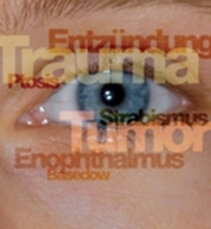Center for Orbital Diseases

Dear patients, dear colleagues,
welcome to the website of the Center for Orbital diseases of the Medical Center – University of Freiburg. Founded in 2008, our Center for Orbital diseases offers comprehensive and high quality treatment for patients suffering from diseases of the eye socket (orbit) within a network comprised of the different specialized departments of our hospital.
Director
Prof. Dr. Wolf Lagrèze
The orbit and its disorders – an interdisciplinary treatment concept

The orbit lies around the eye and encloses the eye as well as the lacrimal channels and a complex system of connective tissue structure which not only keep the eyes and eyelids in place, but also protect and move them. The orbit can be affected by a variety of diseases, including congenital malformations, injuries of the soft tissue or the bone structure, inflammation (partly due to endocrinological disorders), vascular disease, last but not least tumours, which can have life-threatening consequences and may grow out of the orbit into adjoining structures of the skull. For that reason, various medical fields are involved accordingly in the treatment of orbital diseases.
Responsibilities and goals of the Center for Orbital diseases
The members of the Center for Orbital diseases meet once a week for an interdisciplinary evaluation of pending cases. The Center offers optimized interdisciplinary treatment due to fixed communication channels and seamlessly organized processes. Systematic, prospective recording of clinical data allows for a constant advancement in treatment standards.
Participating Clinics, Departments, Sections, and Centers
The Center for Orbital diseases is an interdisciplinary joint venture comprising all departments of the Medical Center – University of Freiburg which treat disorders of the eye socket:
- Eye Center
- Oto-Rhino-Laryngology
- Hematology and Oncology
- Endocrinology
- Oral and Maxillofacial Surgery
- Neurosurgery
- Neuroradiology
- Nuclear Medicine
- Plastic Surgery
- Radiation Oncology
- Comprehensive Cancer Center Freiburg
Orbital Diseases
The orbit can be affected by a variety of diseases. These include inflammation, tumours, injuries (traumata) and vascular diseases. Tumours can have life-threatening consequences and grow out of the orbit into adjoining parts of the skull. Hence several specialist departments take part in the treatment of orbital diseases.
Inflammatory Diseases
The most common inflammatory disease of the orbit is Graves’ ophthalmopathy, an autoimmune disorder that can affect the thyroid gland as well as the orbit. Common symptoms are redness of the eye, bulging eyes (proptosis), and swelling of the lid (edema). This disease can also cause adtortion with double vision through changes in the eye muscles, in rare cases even a compression of the optic nerve. Other diseases are for example orbital phlegmon, orbital pseudotumour, or myositis. The treatment range of those diseases comprises medical as well as surgical measures.
Tumours
A variety of benign or malign tumours can befall the orbit. Tumours either develop within the orbit itself, or they grow into the eye socket from adjoining structures, leading to impaired vision and movement disorder of the eye. Frequent tumours are for example metastases, haemangioma, lymphoma, and meningioma. Most common treatment consists of surgery and radiation therapy, or a combination of both. Malign tumours can make an additional cytostatic therapy (chemotherapy) necessary.
Traumata
About 40 per cent of injuries to the skull bones involve the eye socket as well. Even a small defective position of bone fragments or injuries of soft tissue can cause a disturbance of eye movement with according ambiopia (double vision). Double vision can be a grave impairment to the steering of heavy vehicles and to work. What can also occur is that the eye ball can sink into the eye socket, or an eyelid malposition. For these, we offer a wide range of correctional cosmetic surgery.
Vascular Disease
Just like other organs, the eye socket is interspersed with a complex vascular system. In rare cases this system can be affected by vascular malformation, thrombosis, or retinal vein occlusion leading to a disruption of the eye’s function. Treatment options in this area include interventional radiology as well as surgical intervention.